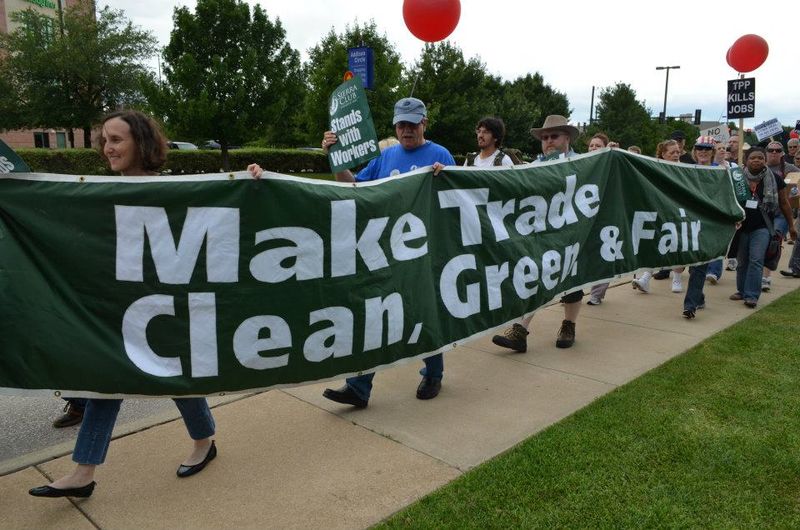
Pacific Rim Trade Negotiations Continue in Secrecy (Op-Ed)

Get the world’s most fascinating discoveries delivered straight to your inbox.
You are now subscribed
Your newsletter sign-up was successful
Want to add more newsletters?

Delivered Daily
Daily Newsletter
Sign up for the latest discoveries, groundbreaking research and fascinating breakthroughs that impact you and the wider world direct to your inbox.

Once a week
Life's Little Mysteries
Feed your curiosity with an exclusive mystery every week, solved with science and delivered direct to your inbox before it's seen anywhere else.

Once a week
How It Works
Sign up to our free science & technology newsletter for your weekly fix of fascinating articles, quick quizzes, amazing images, and more

Delivered daily
Space.com Newsletter
Breaking space news, the latest updates on rocket launches, skywatching events and more!

Once a month
Watch This Space
Sign up to our monthly entertainment newsletter to keep up with all our coverage of the latest sci-fi and space movies, tv shows, games and books.

Once a week
Night Sky This Week
Discover this week's must-see night sky events, moon phases, and stunning astrophotos. Sign up for our skywatching newsletter and explore the universe with us!
Join the club
Get full access to premium articles, exclusive features and a growing list of member rewards.
Ilana Solomon is the Sierra Club's trade representative. This article is adapted from her post to the Sierra Club blog Compass. Solomon contributed this article to Live Science's Expert Voices: Op-Ed & Insights.
Brunei is a tiny, remote country in Southeast Asia with a population smaller than that of Washington, D.C. It's also the location of the current round of trade talks between the United States and eleven other Pacific Rim nations. Who could think of a better place to hold a round of secretive trade talks? And the timing is opportune, too. Held at the end of August, when many — at least in the United States — are away on summer vacation, these trade talks will remain lurking in the shadows, capturing little media or public attention. Between Aug. 23, 2013, and Aug. 30, 2013, trade negotiators from 12 nations will meet behind closed doors in Brunei to further hash out the Trans-Pacific Partnership trade pact. Governments are saying that it might be the last official round of those trade talks — which seems both unacceptable and impossible.
It's unacceptable because not a single word of draft text has been released to the public, despite the fact that the agreement has been under negotiation for more than three years and would affect the lives of millions of Americans and others across the globe.
It's impossible since there are still numerous, critical issues in the pact that remain unresolved going into this "final" round of talks. And, in the context of outspoken citizen opposition, Malaysia has become the first country to say that it will not agree to any timeline for signing the pact.
Some of the most contentious, unresolved issues are in the pact's chapter on the environment — one of many controversial chapters. Here, the United States is pushing a strong conservation proposal that includes specific measures to promote responsible fisheries management, including policies to curb shark-finning, and a ban on trade in illegally harvested timber and illegally taken wildlife and wildlife parts. The U.S. proposal is legally binding and would commit countries not only to enforce domestic environmental laws, but also to enforce commitments made in international environmental agreements. Unfortunately, other countries have thus-far been unwilling to accept the strong U.S. proposal, so U.S. negotiators might be bullied into backing down at this final round of trade talks. A number of North American environmental organizations have already weighed in, calling on U.S. Trade Representative Mike Froman to oppose efforts to weaken environmental protections. In Brunei, the United States must hold its ground and not put critical environmental objectives — like shark fins — on the chopping block. In addition to the uncertain environment chapter, the Sierra Club is deeply concerned about a number of parts of the trade pact that seem to be closer to completion. For example, rules championed by the United States that give corporations virtually unfettered rights. Those rules would allow corporations to sue governments over laws and policies that might reduce their profits. Surprisingly, these egregious rules have been less controversial and are further along in negotiations than the environment chapter. Similar rules in other trade pacts have resulted in assaults on such policiesas a time-out on fracking in Quebec or a commitment to phase out nuclear energy in Germany.
Of course, without full access to the texts, the public has not even been able to have a meaningful conversation about what those rules would mean for fighting climate disruption and protecting communities across the globe. Given this context, the idea that the 19th round of trade talks in Brunei might be the last official round is particularly unacceptable. It seems very clear that negotiations aren't going to end after Brunei.
What might happen, however, is that negotiations go even further underground, hidden deeper from the public. That means that now is the most important time to spread the word about this trade pact and demand transparency in these talks that will affect our food, water, air, jobs and more.
Get the world’s most fascinating discoveries delivered straight to your inbox.
The views expressed are those of the author and do not necessarily reflect the views of the publisher. This article was originally published on Live Science.
 Live Science Plus
Live Science Plus










